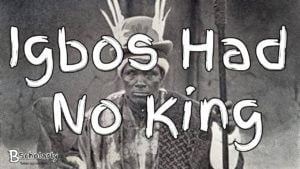Why Indirect Rule failed in Eastern Nigeria: To understand Nigeria, you need to know some of the things that happened during the colonial erra. There is no doubt that almost all the things we identify as problems of Nigeria currently, began during the colonial erra. Some were caused by the colonial masters themselves, and some started as consequences of the leadership of the military in Nigeria. For instance, it is my view that the reason why there is ethnic disunity in Nigeria is because, the colonial masters divide and administered the country differently during colonialism.
Well, that is not the topic I will be discussing today. In today’s discussion, we will be looking at why indirect rule failed in Eastern Nigeria. Conversely, I will share with you the reasons why the eastern part of Nigeria vehemently opposed indirect rule by the colonial Masters.

But because I will go into the crux of this topic, i would like to explicitly explain to you what indirect rule is. Trust me; this will go a long way to help you understand the reasons for the failure of indirect rule in Eastern Nigeria when i begin to mention and explain them. So, what is indirect rule?
Also read:
- Pillars of democracy in Nigeria: Top 7
- Human rights in Nigerian Constitution: See cases and provisions of the constitution
- Richest lawyers in Nigeria 2020
- See the highest paying law firms in Nigeria
Definition of indirect rule:
Indirect Rule is a system of governance which uses the people in authority to control the masses. Wikipedia postulates that Indirect rule was a system of governance used by the British and French to control parts of their colonial empires, particularly in Africa and Asia, through pre-existing indigenous power structures.
In Nigeria for instance, the traditional leaders were employed by the British to administer the affairs of the local people. Basically, the reason why the colonial masters chose to use this system for Nigeria was to reduce the cost of leadership.
Watch this short video on why Indirect Rule Failed in the Eastern part of Nigeria
Why indirect rule failed in Eastern Nigeria
Below are the reasons why indirect rule failed in the east:
- Decentralized nature of government
- Introduction of Warrant chiefs
- Opposition by educated elites
- Introduction of tax system
- Non-participation by the educated elites
In short, these are the reasons why indirect rule failed in Eastern Nigeria. Nonetheless, if you really need information on the points raised above, i enjoin you to keep reading this work as i will painstakingly explain everything.
1. Decentralized nature of government:
One of the major reasons why indirect rule failed in the the east was because of the decentralized system of government in the east. Apparently, the east was made up of majorly Igbo, and the precolonial political system of the igbos was democratic in nature. That is to say, powers were not concentrated in the hands of one single person.

It was obviously unapt to practice indirect rule in that kind of system because there was the absence of a particular political authority. Thus, when the British brought indirect rule to the system it didn’t work smoothly for them. They had to look for authorities in the Eastern part of Nigeria who they could use, but they didn’t find any.
Also read: Benjamin v Kalio: Case on evidence law in Nigeria
2. Introduction of Warrant chief:
Following the failure of the colonial masters to find a Supreme authority in the east, they decided to introduce the warrant chiefs, whom they gave powers to control some of the political affairs of eastern Nigeria. Warrant chiefs were influential men appointed by the British to take charge of the local administration.
This step was vehemently opposed by the people. Naturally, Igbos (easterners) were acephalous in nature. That is to say, they didn’t have any particular political head. Thus, the introduction of the warrant chief was against the world view of the Igbos.
They actually did everything to wreck the introduction of warrant chiefs into their system but they could not stop the colonial masters. In my view, the idea of warrant chiefs was strictly imposed on the east to ensure the success of colonialism in that region. Evidently, this was why indirect rule totally failed in the east.
3. Opposition by educated elites:
Even before the coming of the colonial masters, easterners already had educated elites in the society who understood exactly what the colonial masters were trying to do. Thus, most of the educated elites in the East strongly opposed the system. They did everything possible to frustate all the things colonial masters did to ensure the success of indirect rule.

Some of the educated elites at that time started enlightening the young and illiterate ones among them, not to accept whatever the colonial masters proposed. This was very fatal to indirect rule in that region. In my view, it contributed to about 40% of the reason why indirect rule did not succeed in the east.
4. Introduction of the tax system
Do you remember what led to the Aba Women’s Riots of 1929? It was a revolt against the tax system introduced by the colonial masters. Tax is something that is unusual to the east before colonialism. They were not paying tax to any authority until the colonial masters opted that market women should pay their taxes through the warrant chiefs.
History tells us that the colonial masters actually stated the paying of tax because they lacked fund to run the administration. Thus, imposing tax on the east was the only way they could get money to run the administration.
When the tax system was introduced, market men and women vehemently opposed it. It was totally against the Igbo system. This apparently led to the Aba Women’s Riots of 1929. During this riot, market walked naked on the street to show that they were against the tax system. All these things contributed to the reason why indirect rule failed in the east.
Also read: Ukeje v Ukeje: Nigerian Supreme Court case on the discrimination against women
5. Non-participation by the educated elites:
Knowing fully well that their core aim for using indirect rule will not succeed if the educated elites in the Igbo society were allowed participate in the leadership of the east, the colonial masters decided not to invite the educated elites to participate. They went to the illiterate and weak leaders; who were not able to figure out what exactly their plan was.
On the other hand, when the educated elite in the society discovered this, they did everything possible to destroy the idea of indirect rule in the east. In my opinion, not allowing the participation of educated elites was the worst thing colonial masters did. It is, in fact, one of the main reasons for the failure of indirect rule in Eastern Nigeria.
Must read:
- Less competitive universities in Nigeria that gives admission easily
- Nigerian cases on frustration of contract
- Leading cases on the law of contract
- Best commercial courses to study in Nigeria
By way of conclusion, i must let you know that many other factors contributed to the failure of indirect rule in the east. However, these are the major reasons why indirect rule totally failed there. In summary, it is clear that the core reason why colonial masters failed in trying to introduce indirect rule in the east was because, the features of the system was oppose to what was practiced in the Eastern part of Nigeria.
Hope you enjoyed reading this awesome work? If you still have any question or contribution on this topic, please let me know using the comment section. I will be very glad to hear from you!

Edeh Samuel Chukwuemeka, ACMC, is a lawyer and a certified mediator/conciliator in Nigeria. He is also a developer with knowledge in various programming languages. Samuel is determined to leverage his skills in technology, SEO, and legal practice to revolutionize the legal profession worldwide by creating web and mobile applications that simplify legal research. Sam is also passionate about educating and providing valuable information to people.
Did the indirect rule succeed in westhern nigeria?
I am looking for ten reasons why indirect rule system failed in the south
Me too
Thanks for your enlightenment